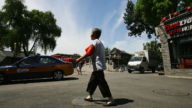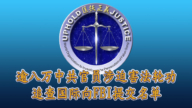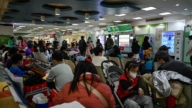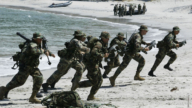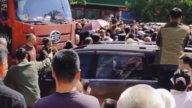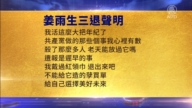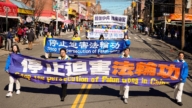【新唐人2011年7月16日讯】自江泽民病危及病死的消息传出以来,如何给江泽民盖棺定论,已成为中共当局极具争议和头痛的事情,甚至由此引发政治斗争。江泽民的生平劣迹,也引起海内外各界的关注。本台对江泽民的恶行丑事做出系列报导,今天的话题是江泽民“镇压学运”。
1989年的学潮一开始仅仅有学生的参与,而从学生运动到全民运动的转折点,则是当时担任上海市委书记的江泽民整肃《世界经济导报》事件。
江的整肃行动,连同《人民日报》“4.26”社论将学运定性为“动乱”,最终成为中共武力屠城的导火索。江泽民由此发迹,被党内几位保守派大佬看中,踏着“6·4”鲜血登上了中共党魁的位置。
原《世界经济导报》驻北京办事处主任张伟国介绍说,《导报》是当时中国绝无仅有的一家民办报纸,也是最早、最活跃的倡导政治体制改革和民主思想的报纸。
89年4月15号,中共前总书记胡耀邦猝逝,引发北京的学潮。胡耀邦因为同情学潮,被党内保守派指责反对自由化不力,87年被迫辞职。
张伟国(原《世界经济导报》驻北京办事处主任):“《世界经济导报》当时在北京举行了悼念胡耀邦的座谈会,提出了中共历届总书记都没有好下场,从陈独秀到胡耀邦,几乎每一个总书记都是非正常程序下台的﹔共产党要想成为一个现代国家的执政党,就应该实行政治体制改革。”
《导报》总编辑钦本立用5个版面,刊出张伟国报导座谈会的专稿,为胡耀邦鸣不平。随后,江泽民、曾庆红高调查禁报纸、将钦本立撤职审查,并派整顿工作组进驻报馆。
张伟国:“他们打报告说:我们《世界经济导报》是要逼邓小平检讨,重新评价胡耀邦。所以这个时候那就采取了先发制人的措施,抢在中央表态之前,就是‘4.26’社论之前,就处理查封了那一期的《世界经济导报》。”
在《人民日报》“4.26”社论指责学运为“动乱”后,江泽民进一步下令《导报》停刊。江的整肃引发了全国新闻界的抗议,人们纷纷上街声援《导报》,他们的行动与学潮相互声援,扩大了声势和社会各界的参与。
张伟国:“赵紫阳访问朝鲜回来以后,在政治局会议上面也批评了江泽民对《世界经济导报》处理的不当,所以他也有一点惊慌失控,当时他采取的几个步骤一个就是,让上海市委宣传部的部长陈至立来顶这个罪。”
当时,张伟国在北京请了一些法律专家教授,专门起草了起诉江泽民和上海市委的起诉书,准备通过法律诉讼,来使得《导报》事件有一个新的结果。
江泽民早在86年就尝到了暴力镇压学运的甜头。89年初,江泽民向中央政治局和中顾委发出通报,批评赵紫阳总书记只搞改革开放,不坚持四项基本原则。张伟国指出,查封《导报》事件是江泽民参与党内保守派“倒赵”阴谋的一个步骤。
“6·4密件”中的会议纪要透露:江泽民早在5月10号的政治局会议上,就敢于当面顶撞赵紫阳,坚持镇压《导报》有理。早在屠城之前,江就写密信给邓小平,信中说如不采取“果断措施”, “任资产阶级自由化泛滥,就要亡党亡国。”
江泽民受邓小平委托参与“6·4镇压”的整个决策和实施,在中共的“6·4档案”中也有记录。5月23号,邓在北京西山接见江,江得到邓的赏识,邓告诉江准备接替赵紫阳成为中共总书记。
江泽民随后奉命回到上海,把提前结束访美归来的万里软禁起来,以邓的“密信”迫使他表态支持戒严。
张伟国:“如果讲89年是邓小平是政变的话,那么江泽民实际上是很重要的一个帮凶,或者是很重要的一个角色。因为万里是人大委员长,是一个合法的、回来主持工作的一个人选,如果他回到北京,举行人大会议、讨论人大代表的提案,那中国就会出现另外一个局面。”
由邓小平建议,江泽民于5月27号起参加了“5人核心班子”,行使中央政治局常委会的权力,直接对邓负责,全权处理“6·4事件”,其中江泽民是表现最为积极者之一。
6月4号开枪屠杀学生民众以后,江泽民主要点了张伟国等人的名。随后,张伟国被以“反革命煽动罪”逮捕,入狱20个月。
38军军长徐勤先在“6·4事件”中,拒不服从向学生开枪的命令,也被军委主席江泽民下令在军事法庭秘密审判,关押在监狱5年。十几年来,江泽民持续迫害“6·4”死难者遗属。
而江泽民则成为“6·4屠杀”的最大受益者。前中共中央文献研究室委员高文谦等人士指出,“6·4”反映了中共暴力邪恶的本性,不解体中共,像这种悲剧还会不断的发生,后来对“法轮功”和维权人士的镇压,实际上跟当年镇压学生是一脉相承的。
新唐人记者常春、李元翰、周天采访报导。
Truth about Jiang Zemin: Part V
Same anchor as yesterday, except the last sentence
Today’s topic is Jiang’s suppression of student movements.
At the beginning of the democratic movement of 1989, only students were involved. Its turning point from a student movement to a mass movement is the then-CCP secretary in Shanghai Jiang Zemins purge of “World Economic Herald".
Jiang’s purge of the paper, as well as the Chinese Communist Party’s (CCP) mouthpiece “People’s Daily” defining the student movement as “unrest", became the fuse for the CCP’s massacre of Chinese citizens. Jiang was praised for the bloodshed by several big shots within the CCP. As a result, Jiang used the lives of Tiananmen Massacre victims as a stepping stone to become the CCP’s leader.
Zhang Weiguo, ex-director of World Economic Herald, said that the newspaper was the only private newspaper in China at that time. It is also the first and most active newspaper in China to advocate political reforms and democratic ideals.
On April 15, 1989, CCP’s General Secretary Hu Yaobang suddenly died, leading to a student movement in Beijing. Hu used to sympathize with the student movement. As a result, he was accused by the CCP conservatives to be ineffective in the CCP’s anti-liberalization efforts. In 1987, he was forced to resign.
Zhang Weiguo (ex-director of World Economic Herald): Herald held a forum in memory of Hu Yaobang in Beijing. The forum proposed that almost none of the CCP’s general secretaries stepped down in a normal procedure. If the CCP wanted to become the ruling party of a modern state, it should implement political reforms.
Herald’s editor-in-chief Qin Benli published a special report on the forum, complaining about the CCP’s treatment of Hu Yaobang. Subsequently, Jiang Zemin and Zeng Qinghong banned the newspaper, dismissed Qin Benli and sent a review group to station within the newspaper’s office.
Zhang: People told tales on us that Herald was going to force Deng Xiaoping to self-criticize and to re-evaluate Hu Yaobang’s life. Therefore, they took pre-emptive measures before the CCP central government took its official stance, and banned that particular issue of Herald.
On April 26, People’s Daily’s editorial accused the student movement to be “an unrest". Jiang soon ordered Herald to cease publication. Jiang’s purge triggered a nationwide media protest. People took to the streets in solidarity with Herald. Their actions and the student movement supported each other, and attracted the participation of people from all walks of life.
Zhang: After the CCP’s then-chairman Zhao Ziyang returned from his visit in North Korea, the CCP’s Politburo criticized Jiang’s handling of Herald. Jiang was a little frightened. Then he decided to use Chen Zhili as his scapegoat. Chen was the head of Shanghai Municipal CCP Committee Propaganda Department.
Meanwhile, Zhang Weiguo hired some legal experts to prosecute Jiang Zemin and the Shanghai Municipal CCP Committee. He hoped to change Herald’s fate through legal proceedings.
As early as 1986, Jiang profited from the violent crackdown on a student movement. In early 1989, Jiang wrote to the Politburo and the Central Advisory Commission to criticize Zhao Ziyang. Jiang accused Zhao for engaging in reforms and in opening up China, instead of insisting on Communist principles. Zhang Weiguo said that banning Herald was the first step of Jiang’s plot to topple Zhao.
As per “The Secret Files on Tiananmen Movement”, the minutes of a Politburo meeting recorded that on the meeting held on May 10, 1989, Jiang contradicted Zhao in person, and insisted that his banning of Herald was right. Prior to Tiananmen massacre, Jiang wrote a secret letter to Deng Xiaoping, saying that if they did not take “decisive actions", “bourgeois liberalization will proliferate and destroy the CCP.”
Deng asked Jiang to plan and carry out the crackdown on Tiananmen Movement. On May 23, 1989, Deng received Jiang in Beijing. Satisfied with Jiang, Deng told Jiang that he would succeed Zhao Ziyang to become the head of the CCP.
After receiving Deng’s orders, Jiang put another high-ranking CCP official Wan Li under house arrest. Wan Li was forced to declare his support for martial law.
Zhang: If you call Tiananmen Incident a coup of Deng Xiaoping, then Jiang was a very important accomplice. Jiang played an important role. Wan Li was the chair of the CCP’s National Congress. If he held meetings and made proposals, there would be a different situation in China.
Proposed by Deng, Jiang founded a 5-person “core group” on May 27, 1989. The group exercised the powers of the Politburo’s Standing Committee. It reported directly to Deng and was responsible for handling the Tiananmen Incident. Jiang was the most active member within the group.
After massacring students and citizens on June 4, 1989, Jiang turned to Zhang Weiguo and several others. Zhang was arrested and imprisoned for 20 months, for his “crime of counter-revolutionary incitement".
High-ranking military official Xu Qinxian refused to obey orders to shoot students. After being tried secretly, he was jailed for five years. Since the massacre took place, Jiang had been persecuting the victims’ relatives and the survivors for over a decade.
Jiang became Tiananmen Massacre’s largest beneficiary. Gao Wenqian, ex-researcher at CCP Literature Research Center said, the massacre reflects the violent and evil nature of the CCP. If the CCP is not disbanded, the same tragedy will continue to occur, such as the later persecution of Falun Gong practitioners and human rights activists.
NTD reporters Chang Chun, Li Yuanhan and Zhou Tian.


